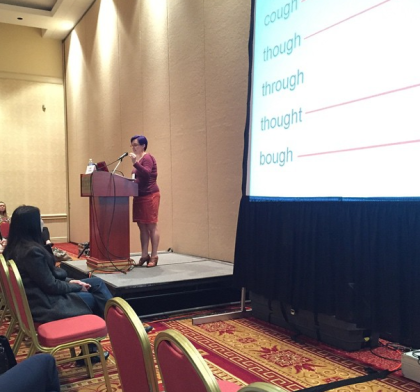Copy editors tend to look at language as written, but the spoken word is king. The spelling of words follow pronunciation.
Modern English, however, is a written language. Few people really speak that way.
Kory Stamper talks about the history of the English language at an ACES session on Thursday.
The development of modern English took hundreds of years and was influenced by a myriad of people such as Chaucer, who chose to write his stories in the “vernacular” instead of Latin or French, although he was perfectly capable of writing in both.
Kory Stamper, associate editor at Merriam-Webster, showed ACES members that English is actually a lot more flexible than we may have realized and that our jobs might not be as cut and dry as we thought.
Stamper wowed the room by reading an except from Beowulf in old and Middle English; then she took us on a whirlwind roller coaster through time, naming the people and cultural forces that influenced what we now know to be modern English.
Most of the attendees were surprised to learn that some of the grammar rules that we so strictly enforce were merely developed in the 17th, 18th, and 19th centuries by grammarians and lexicographers who applied Latin rules to English.
John Dryden, Robert Louth, Lindley Murray and Henry Alford, to name a few, thought English was vulgar, unrefined and inelegant, so they created the rules now thoroughly engrained in each badge carrying member of the grammar police’s minds. Rules concerning that/which/who, terminal prepositions and split infinitives that every copy editor ever can recite without any effort at all. The justification for many of these rules boils down simply to because you can’t do that in Latin.
“The thing is … English isn’t Latin,” Stamper said.
English is a composite — merchants, slave traders, enslaved people, American Indians, and immigrants and their respective languages have all been sources for American Standard English.
We, editors, want to turn all writing into standard, modern, English, but we should do so carefully, with respect for changing rules, new words, and knowledge of English’s complicated history. We have to be as flexible as the language we love.
Dilane Mitchell is a student at DePaul University.
